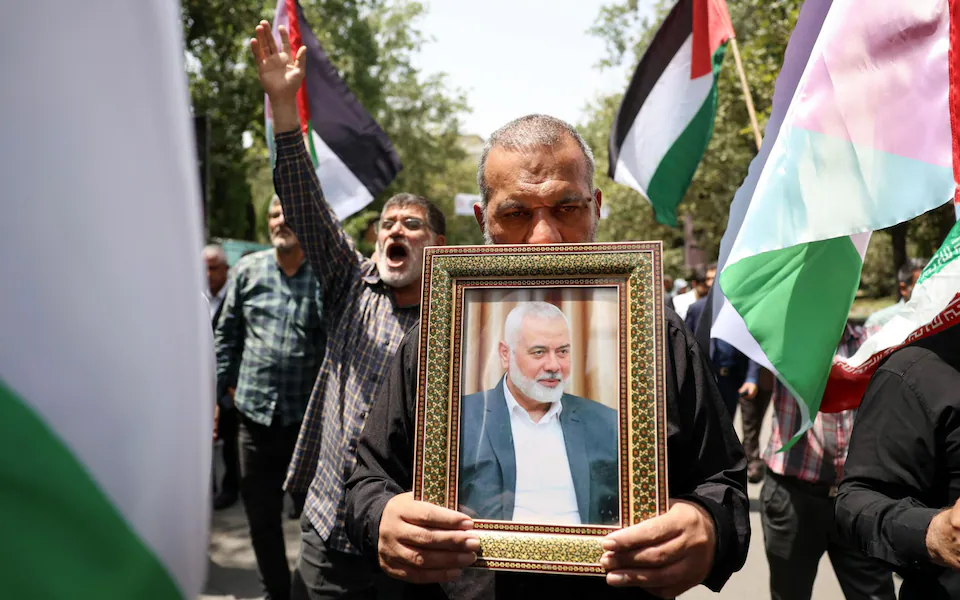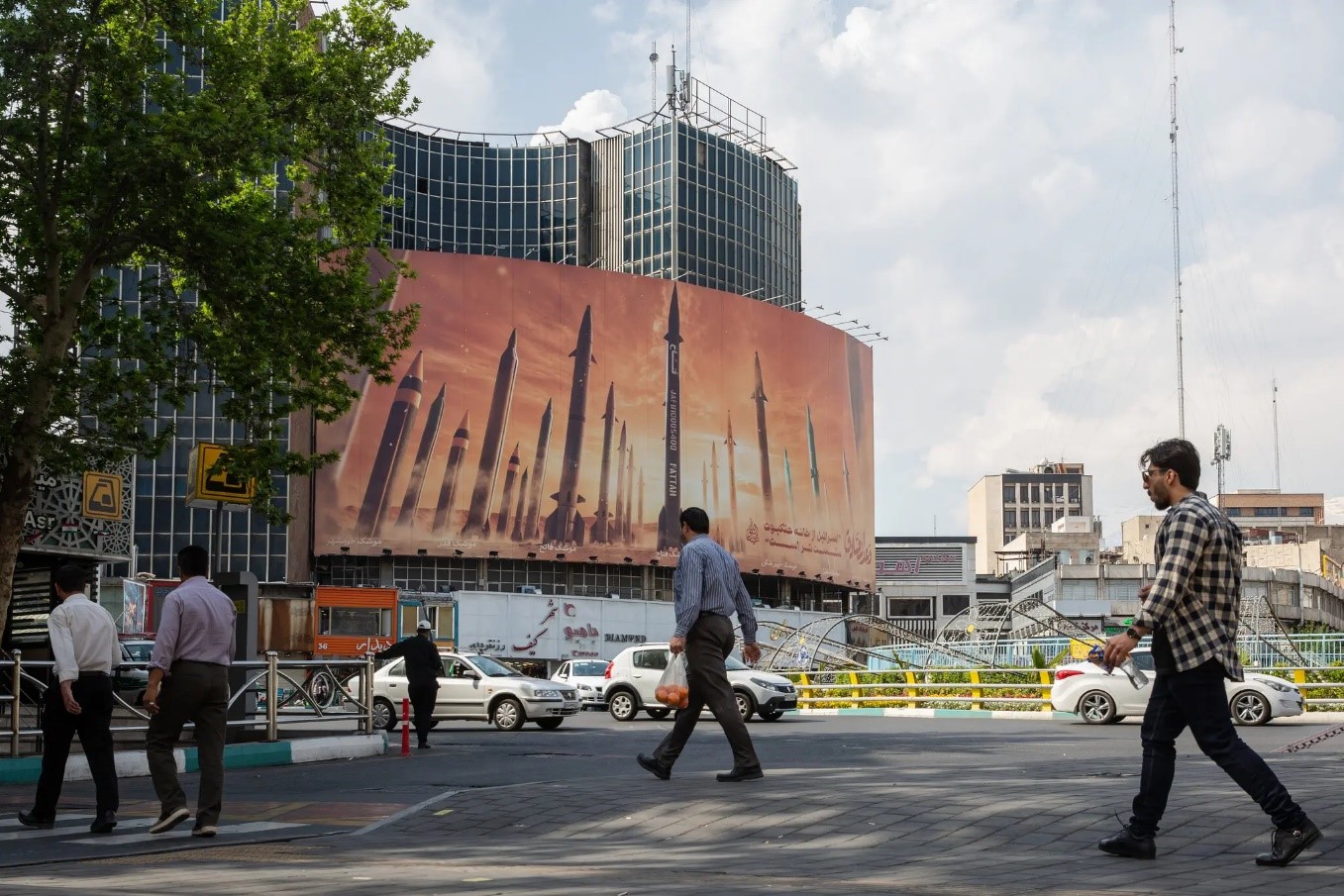By Dimitris Kouvaras,
As most of us are being kept merrily occupied by the Olympic frenzy, a new act in the drama of the Middle East has started; one likely to become highly destabilising for a region whose geopolitics has been hanging in the balance for decades. Besides upsetting regional stability, however, the assassination of Hamas’ deputy commander Ismail Haniyeh, in Tehran on July 31st illuminates the crisis of the Middle East from a broader perspective, which supersedes the geopolitical confines of the Gaza war itself, yet sheds considerable light onto the latter and its management. The Gaza conflict has a long and complex backdrop that I have examined in two previous articles, following the October 7th attacks. What Haniyeh’s assassination brings into the picture is a wider geopolitical game for dominance and financial prosperity in the Middle East, in which Iran and Israel stand as two opposing poles towards which neighbouring Arab countries are called to position themselves (however awkwardly or covertly that happens) under the watchful eye of the United States. In my opinion, it also hints to how Israel aims to use this dipole as a distraction to shift focus out of the terrors of Gaza.
Ismail Haniyeh was a prominent Hamas figure, leader of its political office in Qatar and negotiator in the discussions over a Gaza ceasefire. His assassination was carried out through the detonation of a pre-installed bomb in his room in a Tehran guesthouse, and carefully planned by Israeli intelligence, months ahead of its effectuation. It is linked to a series of offensives between Israel and Iran, the most recent phase of which began with the Israeli bombardment of the Iranian consulate in Damascus on April 1st, which killed several officials and enraged the Islamic Republic. What followed was an unprecedented attack in recent years, which involved over 300 Iranian missiles and drones fired at Israel on July 14th. Despite being unsuccessful, also due to U.S. military involvement in intercepting the incoming warheads, the provocative character of the attack could not be left unanswered by Israel. What followed in late July was two targeted assassinations, whose temporal coincidence (within 24 hours) and setting propagates a direct confrontational message against Iran and its allies. One was Haniyeh’s, who had been in Tehran for the inauguration of a new Iranian President, and the other of Fuad Shukr, senior military commander of the Lebanese Islamist paramilitary and political group, Hezbollah.

These events enable an understanding of the geopolitical power game in the Middle East as a backdrop of the Gaza conflict. What is clear is that Iran and Israel are the two principal opposing poles in the wider region, at least as far as this conflict is concerned. However, as the missile strike in Damascus and the targeting of a Lebanese militia make apparent, Iran is not Israel’s sole adversary nor one acting on its own. The presence of Haniyeh in Tehran was by no means coincidental, given that Hamas is one of the paramilitary groups in the region that are sponsored by Iran and can act as its proxies in taking to the offensive against Israel, seen as an “intruder state” in the Arab neighbourhood. Post October 7th, such groups, including Hezbollah and the Houthis of Yemen, have escalated their military activity by firing missiles at Israel and disrupting global commerce in the red sea respectively. What underlies these actions is a wider goal to reduce and potentially nullify western and Jewish influence in the region, being a statutory objective of Iran’s authoritarian and theocratic state and propagated through an informal alliance involving Iraq, Syria, Lebanon and Yemen, called the “Axis of Resistance”. Following Haniyeh’s assassination, representatives of its members have been called to a convention to discuss retaliation, as was vowed by Iran’s Supreme Leader, Ali Khamenei.
Under these considerations, the Gaza war is not just a conflict over Palestinian territory and legitimacy or statehood, but also a proxy conflict over dominance in the Middle East and the reduction or imposition of western influence. However, in the latter context, Israel’s genocidal approach on Gaza, which has led to more than 39.000 civilian casualties, and the latest direct confrontations with Iran have complicated things further. That’s because the “Axis of Resistance” includes only a fraction of the Arabic nations in the region, with the rest being forced to take an awkward stance towards these developments. Historically, all Arabic nations were hostile to Israel after its western-aided imposition in the region as a state, in 1948, and its later victories over its neighbours, which resulted in territorial losses and the violent displacement of hundreds of thousands of Palestinian Arabs that became refugees in the neighbouring states. Still, public sentiment is bitter against Israel in almost all Middle Eastern countries, yet official attitudes gradually changed. Beginning with Egypt in the Camp David Accords, in 1978, a series of U.S. brokered peace agreements created a pathway towards normalisation of relations with Israel and acknowledgment of its legitimacy in exchange for American aid and territorial restoration. Since the latest Abraham Accords of 2020, involving the UAE and Bahrain, and the agreements including Morocco and Sudan, most other Arab countries have taken similar steps to improve their security, relations with the U.S., trade and financial opportunities. Even Saudi Arabia, Iran’s contender as leader of the Arab world, initiated a rapprochement asking for U.S. technology and a defense pack, a civil nuclear programme and a solution towards Palestinian statehood.

For Israel, this would be the western-friendly “new Middle East”, glued together also because of an opposition to Iran and fear of its military and nuclear power. However, in it there seems to be no room for Palestine. This was made apparent post October 7th, with the decimation of the Gaza strip and its civilian population and forced most of these Arab countries in an awkward position, as they could not ignore Israeli cruelty or public anti-Zionist sentiments. Nonetheless, Iran’s escalation of the conflict on April 14th showed that they didn’t make a policy U-turn, instead providing intelligence to Israel and the U.S. and aiding them in fending off the attack. After all, there’s much to gain (at least it appears so) from an American friendship, or, otherwise, much to lose from disfavour. Moreover, the Iranian block must be put under control, especially if nations like Saudi Arabia want to dominate the region.
What the assassination of Haniyeh illuminates is the appearance of two Middle Eastern blocks in the backdrop of the Gaza conflict, one centered on Iran and one against it, therefore awkwardly supporting Israel, under the pressure of the U.S.. Both Iran and Israel seem to favour escalation. However, the latter can also use it for a different purpose than combatting Iran. It can shift the focus away from the situation in Gaza and onto Iran, taking advantage of its adversities with many Arab countries to divert attention and enhance sympathy, while also forcing the U.S. (for which Iran is a far greater threat than Hamas or any Palestinian organisation) to engage on its side. It can be a great distraction for the West too, amidst fears of a wider conflict. However, the price to be paid can be high and dangerously destabilising. It all hangs in the balance.
References
- Why Israel’s attack on Iranian consulate in Syria was a gamechanger. The Guardian. Available here
- How Hamas Leader Ismail Haniyeh Was Killed in Iran. The New York Times. Available here
- Iran and the Uneasy Arab-Israeli Alliance. The New York Times. Available here
- How and when will Iran retaliate for Haniyeh’s assassination? Iranintl.com. Available here
- Why some Arab states side with Israel? DW News. Available here




